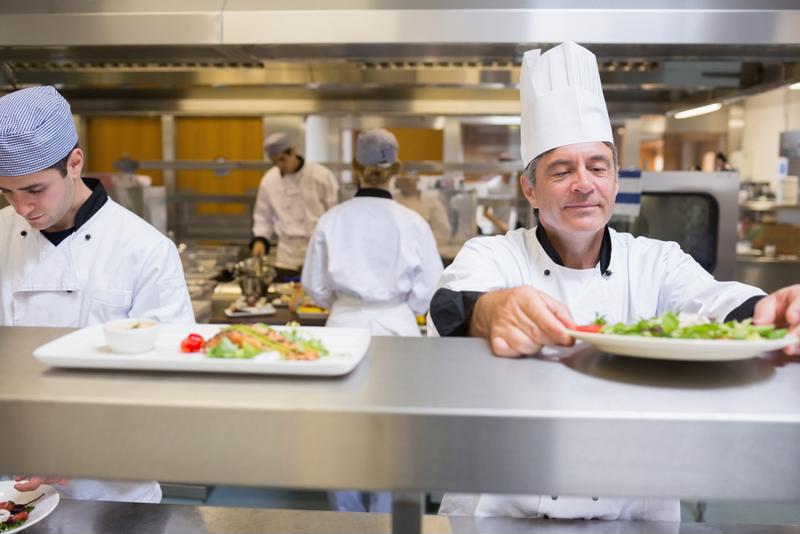Running a restaurant comes with numerous risks, but none is as great as the potential to cause a food-related illness or death. No matter how much precaution and due diligence a manager and the staff undertake to ensure they’re providing a safe product, due to the nature of the restaurant industry and its supply chains, the chances of serving a meal containing a pathogen do exist. For example, the fast casual restaurant Chipotle has recently been linked with people in nine states suffering E. coli infections, according to the Centers for Disease Control and Prevention. The states with reported cases or hospitalizations crisscross the country and include California, Illinois, Maryland, Ohio, Pennsylvania, Minnesota, New York, Washington and Oregon, but with the greatest concentration in the last two states. The authorities have yet to determine what ingredients might have been contaminated and no one specific food has been isolated as the culprit for the outbreak. While 20 people have been hospitalized for illness related to the E. coli infection, there have been no reported deaths. Reports of the outbreak have already dented the popular restaurant chain’s brand. Chipotle’s stock was down sharply following the discovery of the outbreak, with Reuters reporting a decline of around 8 percent in extended trade. The company’s representatives anticipate sales to drop 8 to 11 percent during the fourth quarter. Reducing risks As a national chain with a sizable team of quality control processes and procedures, Chipotle still potentially allowed tainted ingredients to end up on its menus across the country. The repercussions are causing a public relations nightmare for the company and, if found liable for the outbreak, it will lead to serious lawsuits against the food chain.
“The globalization of restaurant supply chains has increased exposure to pathogens.”
As Food Manufacturing noted, the globalization of supply chains has increased the vulnerability of restaurants, exposing products to more pathogens, allergens, contamination and foreign materials. Due to the increased risks, managers and owners must take the necessary precautions to safeguard their food and protect their customers. Food Manufacturing recommended that restaurant operators conduct more audits. While this might include implementing new, more expansive quality control standards for internal purposes, owners and managers should also consider making unannounced visits to the facilities of their suppliers, if possible. This allows both parties to gain a better working relationship with other, instilling trust in each other’s operations. In addition, routinely visiting these facilities ensures suppliers know they will be held accountable for meeting contract specifications and quality assurances. Optimizing supply chains Since restaurants must rely on a diverse array of distributors and vendors for their goods, managers need to ensure they contract this work out to qualified and licensed companies. In addition, taking the extra precautions to vet vendors, either through the Better Business Bureau or through online reviews can help reduce the chances of contamination. As CNBC reported, Chipotle is known for using fresh ingredients in its meals. While this might be good for providing higher quality food, the lack of cooking makes it easier for pathogens like E. coli to flourish. The company has tested thousands of food samples from stores linked to the outbreak and have shown there is no more E. coli left in its supply chain.
 Implementing additional quality control standards can potentially reduce the spread of contaminated food.
Implementing additional quality control standards can potentially reduce the spread of contaminated food.While a larger company like Chipotle can take a hit of this magnitude and continue operating, smaller restaurants cannot afford even the slightest link to an E. coli outbreak or other type of contamination. A single-shop restaurant with a slim profit margin can potentially see its doors shuttered if even one customer ends up getting sick from eating there. Unfortunately, no matter how thoroughly managers audit ingredients and train staff, there will always be a chance that contaminated food might make it into the store since restaurants are so reliant upon outside vendors to distribute products. In a scenario where a restaurant unwittingly serves spoiled or contaminated food, the establishment needs to have the right coverages in place to protect their interests. The existence of this possibility means restaurant umbrella insurance is a must for any food establishment. By partnering with McGowan Program Administrators, insurance brokers can team with industry experts who have the experience and knowledge to ensure stores get the unique restaurant umbrella insurance they need. With so many other potential problems to be on the look out for, restaurant managers and owners can focus on serving quality food and let McGowan worry about expecting the unexpected.


